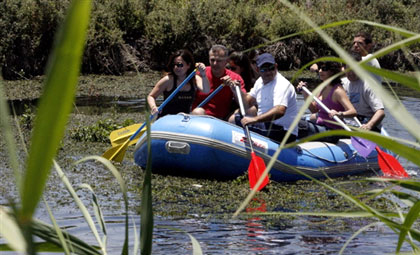 There are however some reasons for optimism, as there is a growing environmentalist movement in the country and a budding ecotourism sector that promotes low-impact, small-scale travel that is good for both nature and local communities.
Ecotourism is gaining ground, as a slew of new “Ecolodges" that allow tourists to enjoy some of the most stunning corners of the country have opened up in and around traditional villages. These resorts are oriented around the idea of total self-sustainability, and offer hope that the relationship between the economy and the environment can be something other than the former pummeling the latter.
There is a real market for ecotourism in Lebanon, there being both the high supply of and demand for eco resorts, said Gilbert Moukheiber, manager of the Alternative tourism project at MADA, a Lebanese NGO.
Environmentally friendly tourism in Lebanon dates back to 1996, when the company Wadeh Expeditions began offering the country's first "ecotours". In the thirteen years since, a steadily increasing number of companies have popped up to take advantage of the large potential for outdoor recreation here, offering everything from snowshoeing and back-country skiing in the winter to hiking, river rafting, herb picking and “donkey safaris” in the summer.
Ecolodges, accommodations designed to have the least possible impact on the environment, are also flourishing in Lebanon. Tarhal, another MADA project, is based in the northern areas of Hermel, Akkar and Donniyeh and focuses on involving local communities in the venture. Local residents are trained in cleaning, cooking and receiving visitors in their often newly-revamped and eco-friendly homes, rendering the experience at once more authentic and more beneficial for hosts and visitors alike. For example, since opening on May 22, Tarhal’s ecolodge in the northern village of Kwakh has received over 300 guests.
Similarly successful has been EcoVillage, which lies at the bottom of the gorgeous valley in the Chouf, just 20 kilometers outside of Beirut.
Advertising itself as an "organically-grown project," EcoVillage, explains founder Karim el-Khatib, is the product of a group of Greenpeace activists' desire to create a place "to teach about sustainability in a setting that is itself sustainable and clean, from energy to food to waste."
Khatib describes the place as a family-run organic farm, where visitors can hike, swim and lounge around the restaurant area. Yoga and meditation is also available, usually at an additional cost. Responses, says Khatib, usually come along two lines; some visitors embrace the concept while others struggle with their loss of comfort, such as A/C or their cars.
Given the latter, it is surprising that, as Moukheiber says, eco-resorts have so far attracted mostly Lebanese visitors. "[The country] is not well-structured on the political map, but the potential is very present,” he said, adding that expatriates and foreigners are increasingly flocking to eco resorts.
On a recent trip to EcoVillage, at least one foreigner was impressed by the environmentally-oriented entrepreneurial spirit he encountered.
“Lebanese seem open-minded and receptive to new ideas," said Ali Flint, an American who used to work in banking and is now traveling the world. The country's unique natural beauty, with its beaches and mountains, will draw lots of "California-type people," she added.
Be that as it may, a number of visitors found some cause for concern at the resort. One young woman from France said that most of the EcoVillage’s employees seemed to be Filipino immigrants and wondered what kind of working conditions they were subjected to, as migrant workers are often exploited and underpaid in Lebanon.
Khatib maintained that most of the staff are locals, and that the Filipinos who are working there are paid well.
And it is hard to fault the goal EcoVillage set for itself when it first opened in 2003: to educate youth on the environment.
"Kids come for the Green Day Out project,” Khatib says. “We teach them about wild plants, or how long it takes for a cigarette bud to decompose. We host treasure hunts and talk about biodegradability."
Likewise, the Lebanese company Adventure Group has made educating children a central mission, according to Moukheiber. To that end, the group offers “Green classes" in the summer and "White classes” in the winter to give young people hands-on training on how to protect and preserve the environment.
While instilling environmental consciousness in the future generations is the best way to save what’s left of Lebanon’s great outdoors, hopefully, if ecotourism becomes the next big thing it Lebanon, resort owners won’t fall into the trap of trying to maximize profits at the expense of the very environment they say they want to save.
|
